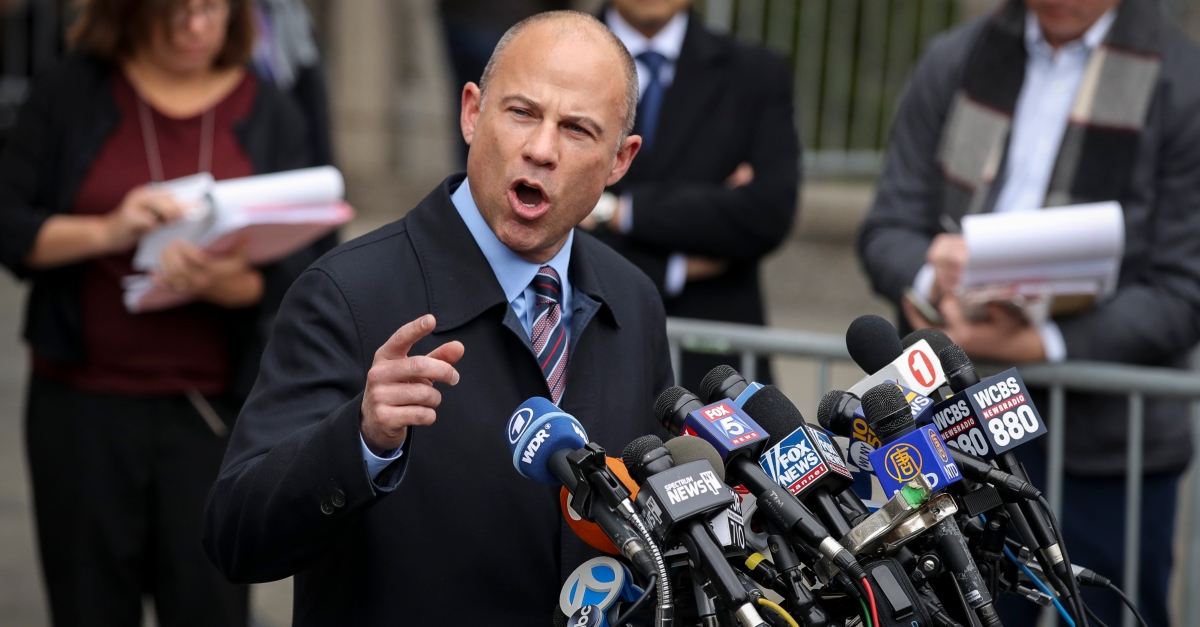
A federal judge in New York City has allowed a fraud case against celebrity attorney Michael Avenatti to move forward. The high profile attorney-turned-defendant had previously submitted a motion to dismiss–which was denied on Monday morning.
Avenatti responded to the order in a statement to Law&Crime:
“Allegations” mean nothing. Once the actual evidence is presented in the Nike trial, I will be fully exonerated because I did absolutely nothing wrong.
The former attorney for Stormy Daniels was indicted by the Southern District of New York (SDNY) in March 2019 on multiple charges related to an alleged extortion plot that prosecutors say was aimed at athletics apparel giant Nike.
Per the SDNY, Avenatti authored a series of communications to Nike representatives which demanded payments in excess of $23 million in return for a promise that he would cancel a planned press conference calling out the company over their own allegedly untoward practices.
Nike is suspected of improperly funneling money to top-tier college basketball players in violation of NCAA rules. Avenatti had apparently come by such knowledge through his own representation of youth basketball coach Gary Franklin.
The famous attorney, according to prosecutors, had threatened to release that sensitive information just before an earnings call and thereby severely damage their stock price and reputation.
The Monday order recites those allegations:
In a March 20, 2019 telephone call with Nike’s counsel, Avenatti reiterated that he expected to “get a million five for [Client-1]” and to be “hired to handle the internal investigation,” for which he demanded a “multimillion dollar retainer” in exchange for not holding a press conference. According to Avenatti, “3 or 5 or 7 million dollars” would not be sufficient for his retainer. Unless Nike agreed to a larger retainer, Avenatti would hold a press conference that would “take ten billion dollars off [Nike’s] market cap” Avenatti also stated that “he expected to be paid more than $9 million.” At end of the call, Avenatti agreed to meet with Nike’s lawyers the next day.
During that meeting, Avenatti was arrested by agents with the Federal Bureau of Investigation (FBI) and charged with various counts related to the alleged shakedown scheme.
Avenatti has consistently denied the charges and has made efforts to cast Nike itself as the actual criminal party.
“Nike bribed over 100 players as part of their scheme and purposely hid the payments from the [National Collegiate Athletic Association (NCAA) and federal] investigators,” he said in April of last year.
“Carlton DeBose, a Nike executive, has bribed over 100 high school players over the last [four] years to play college basketball at colleges affiliated with Nike as opposed to other schools. He has used bogus invoices and countless coaches to further the scheme [and] deliver the [money],” Avenatti tweeted at the time.
In December 2019, the government dropped two initial charges of conspiracy against Avenatti and replaced them with one charge of honest services fraud–prompting his attorney Scott Srebnick to criticize the prosecution’s legal arguments.
“The government’s whole theory was that Avenatti was shaking down Nike,” Srebnick said late last year–noting that the government’s case had substantially “morphed” since the charges were first filed. “It’s hard to know from this indictment exactly what this bribery scheme was,” he continued.
That purported confusion over the permutation of the government’s argument itself morphed into the defendant’s overarching argument in his latest bid to have the SDNY indictment tossed.
Avenatti based his motion to dismiss on the notion that the government failed to state any “wrongful” conduct on his behalf and that the indictment filed against him was constitutionally vague. The court rejected both of those arguments in turn.
“Because these counts track the language of the respective statutes, apprise Avenatti of the nature of the accusations against him, and provide notice generally of where and when the crimes occurred, they are legally sufficient,” U.S. District Judge Paul G. Gardephe wrote in his 18-page opinion.
Gardephe also said it was too soon to consider vagueness arguments.
“Avenatti’s motion to dismiss on vagueness grounds will be denied as premature,” the judge wrote. “It is worth noting, however, that similar vagueness challenges to the extortion statutes have been rejected.”
Avenatti contends he was engaging in bog standard litigation hardball–asserting that threats in civil litigation are more or less the norm. The SDNY, however, says there’s nothing particularly normal about Avenatti’s litigation techniques.
At the heart of the government’s case is the claim that Avenatti engaged in those alleged efforts without Franklin’s consent.
Again the Gardephe order:
Avenatti argues that “[c]ourts have largely exempted [litigation-related ] threats from the extortion statutes as a matter of law because, by its very nature, litigation is inherently threatening and poses a risk of economic loss to all parties.” But the unusual feature of this case is that the Government alleges that Avenatti – using his client’s confidential information – demanded millions of dollars for himself, without his client’s knowledge, and to his client’s detriment. These factual allegations take this case outside the usual parameters of civil litigation, constitute “wrongful” conduct, and raise the specter of extortion.
Read the entire memorandum opinion and order below:
SDNY Order on Avenatti Motion to Dismiss by Law&Crime on Scribd
[image via Drew Angerer/Getty Images]